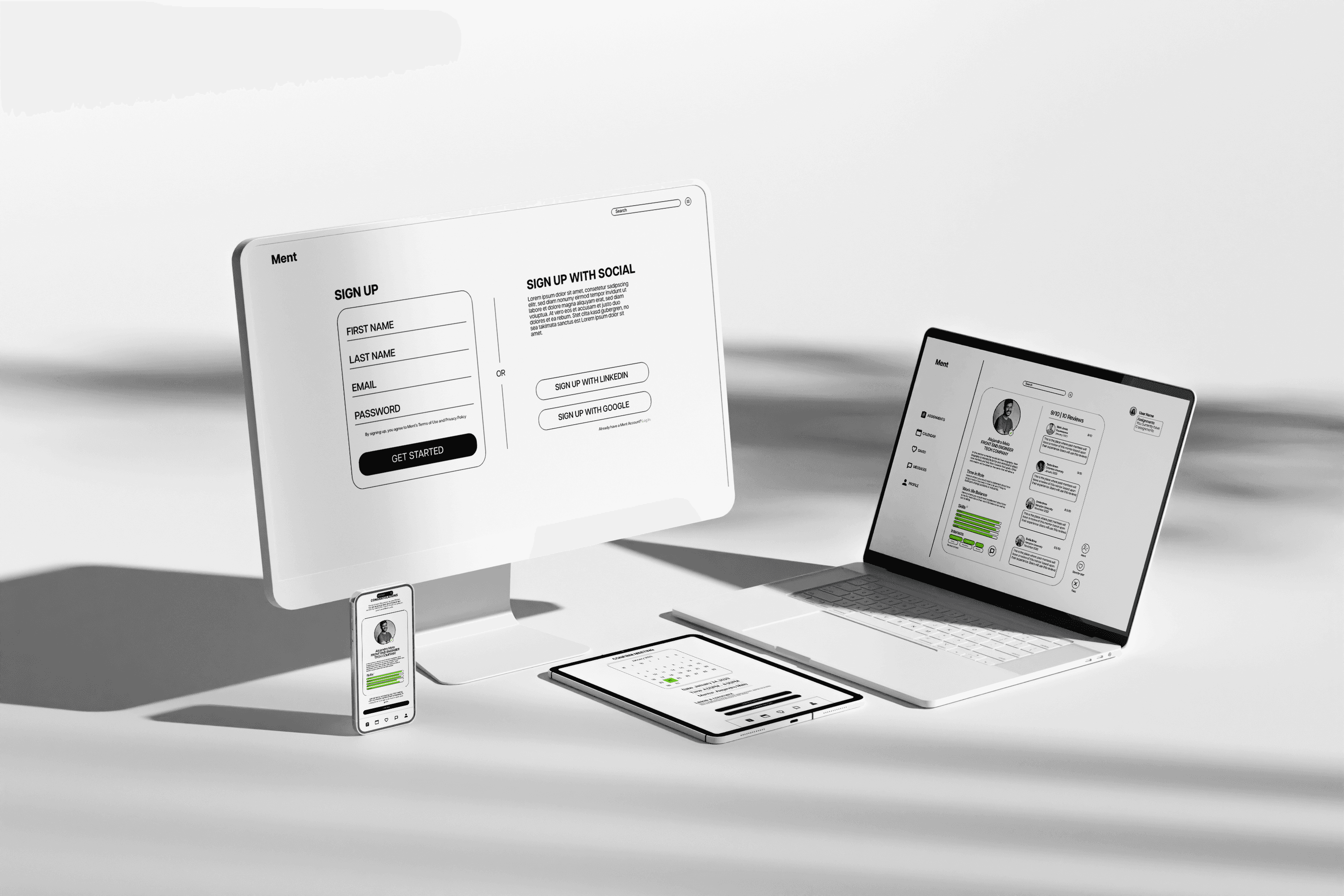MENT
Client
Project type
year
Project Overview
From December 2022 to January 2023, as a part of my Professional UX Design Certification from Google, I embarked on an exciting journey to develop a cutting-edge multi-platform career mentorship service tailored specifically for new college graduates. Leveraging my expertise in Adobe XD, Figma, Jamboard, and Google Forms, I meticulously crafted an innovative solution that seamlessly connects aspiring graduates with experienced mentors, fostering invaluable guidance and support throughout their career transitions. This project was dedicated to empowering the next generation of professionals.
Here is a link to the full case study on Behance: https://www.behance.net/gallery/162506113/UX-Case-Study-Ment
The Problem
Graduating college should be a time of celebration that students enjoy with their families. However, this time can often be stressful to students who may not know what their next steps are following graduation. Many things can lead to not having a clear path: busy academic and extra-curricular schedules, not attending a college or university with professional development resources and many other factors can lead to a student not having next steps.
One key thing that could change this for students is having a proper mentor to help them navigate not only the professional world, but life as well.
Our Goal
Our Goal at Ment is to ensure college students, those approaching graduation, or those already on their next chapter have the ability to foster meaningful connections that help them give their careers a fresh start.
We understand the impact that meaningful connections can have on one's professional career, we've been there, and want to help others grow and develop.
My Role
This case study was conducted as a part of the Google Career's UX Professional Certificate, and I served as the Lead UX Designer. I was responsible for all 5 phases of the UX design process: Empathizing, Definition, Ideation, Prototyping and Testing specifically focusing on the interaction design and information architecture in this project.
Competitive Analysis
To being the empathize phase I wanted to understand what users may experience on other professional networking platforms. Research was done on 3 different platforms: Handshake, UStrive and LinkedIn.
While these platforms were good at assisting college students in finding jobs and progressing in their career, only UStrive focused on connecting students with mentors.
Overall, I concluded that students needed a way to find and connect with a mentor of a similar or desired background, so that they could feel better prepared for their next steps, and in their career development.
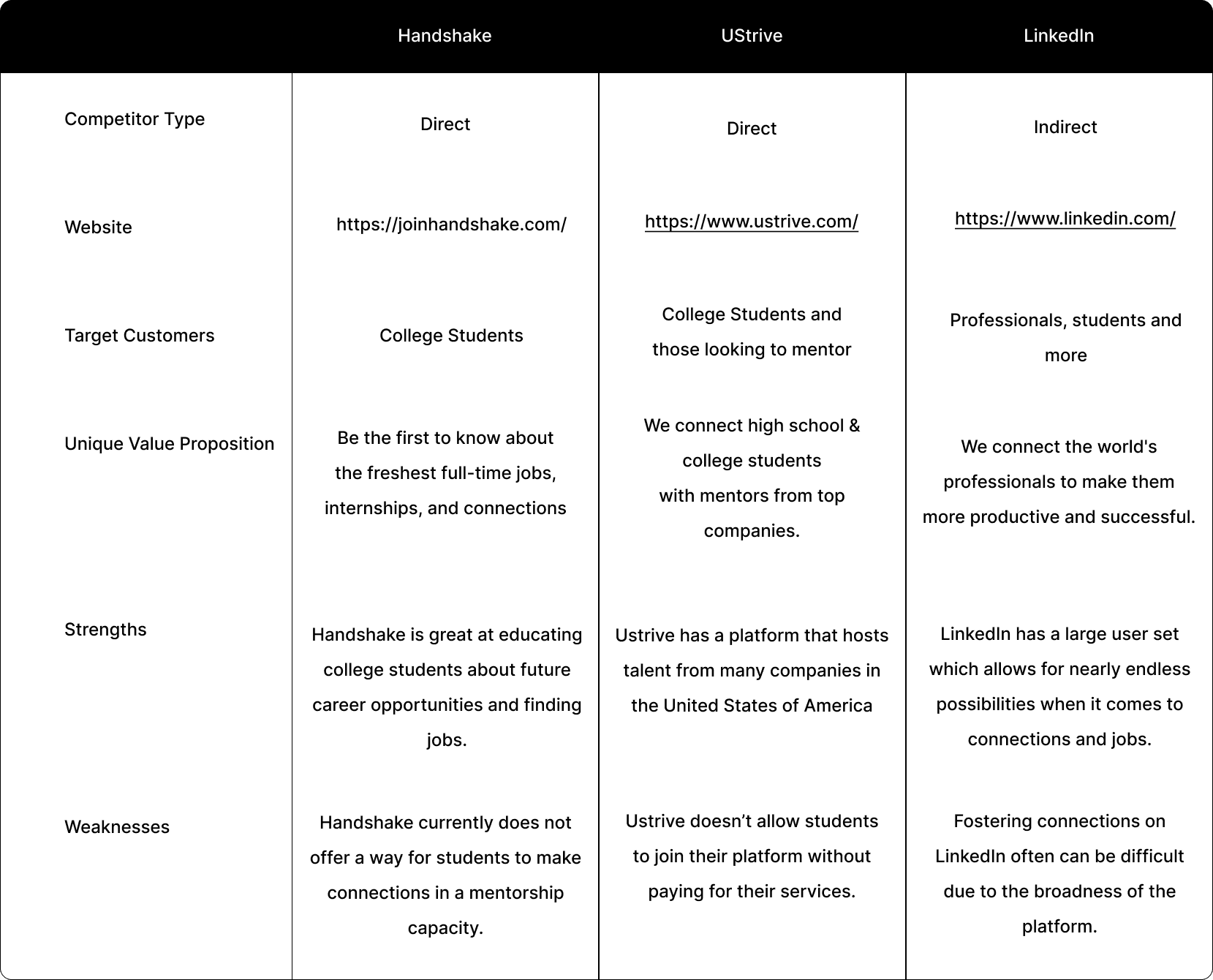
Research
Individual collegiate journeys differ just as much as the paths individuals take after graduation. The question proposed is: "What truly makes one successful after college?" Based on research done (view references at the end of case study), there is far too few evidence that leads to one solution. However, what was discovered is that students who had a mentor at some point during their collegiate and/or post grad career, felt more confident about their next steps.
Therefore, using Google Forms, I sent a survey to those who had graduated from my alma mater in the most recent 4 years. Their backgrounds ranged from employed to self-employed and the length of time they've spent in career varied as well.
The scope of the survey was to discover how long it took individuals to find a job after graduation, to discover how many of which were in their desired careers directly following graduation, to discover how many had mentors, and to evaluate their overall happiness in career.
Results
Even though our research couldn't determine every factor that lead to a participants career happiness, we did notice a trend:
Mentorship was the key!
The participants who listed they had a personal mentor help them with their career paths not only felt as if they knew of the proper steps to take after graduation, but they also found an enjoyable career path faster than the rest of our participants. A common theme found was that: those who had a mentor who cared about their future entered a desired career quicky and were satisfied.
Personas

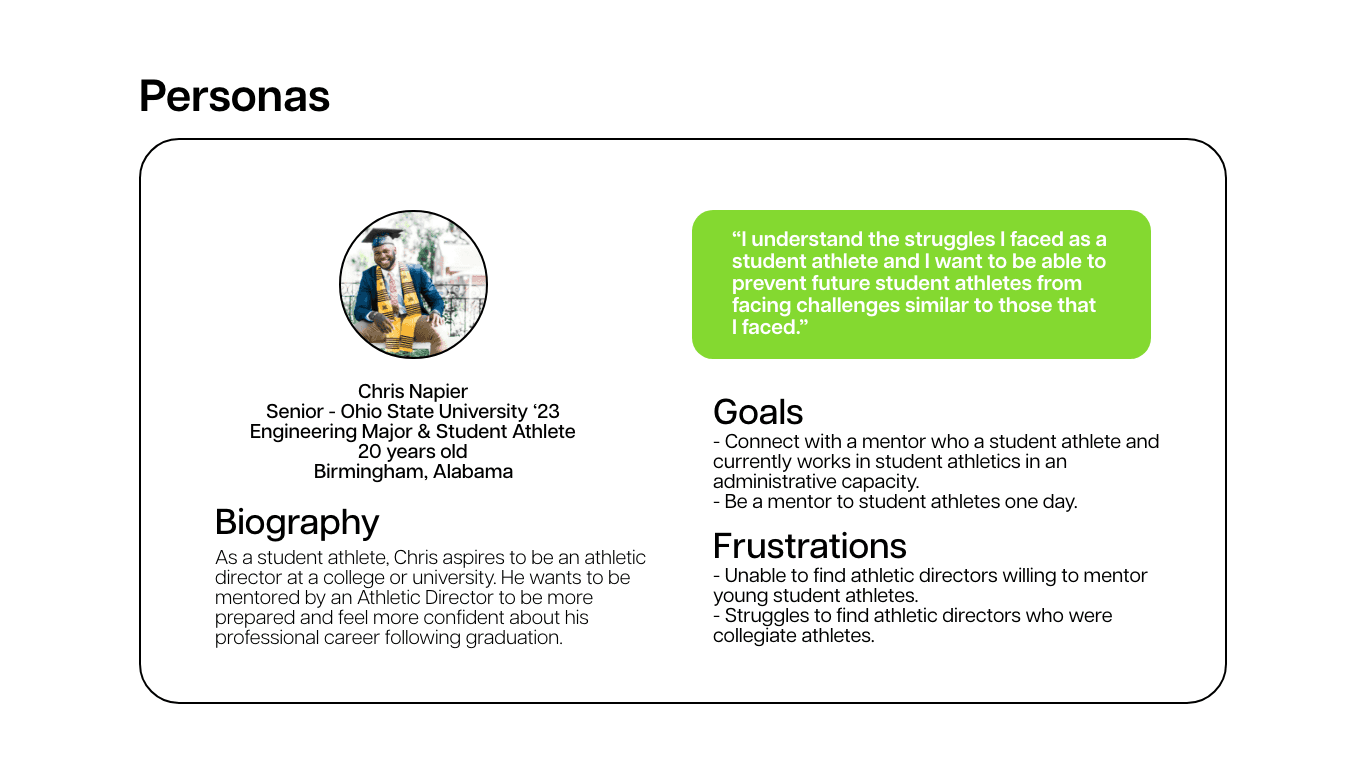
User Journey
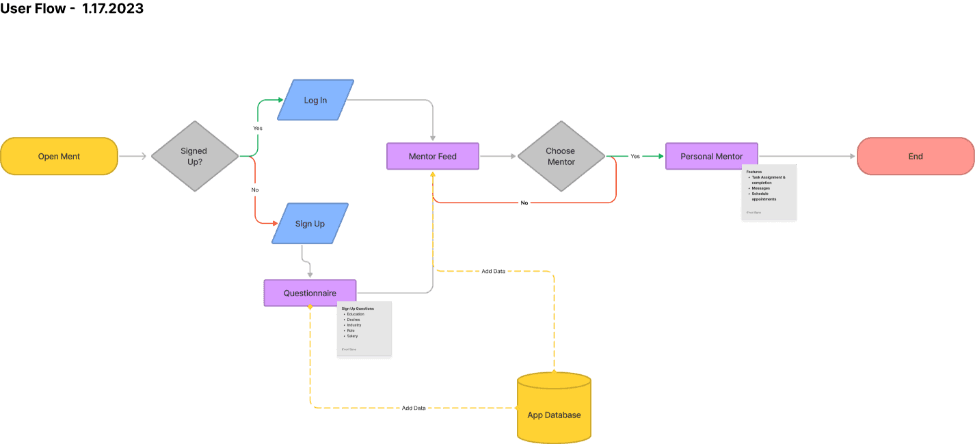
Design Phase
Paper Wireframes
Now that we had an idea of who would be using our app and what their user journey may look like it was time to start brainstorming designs. Here's what the paper wireframes looked like for this project.
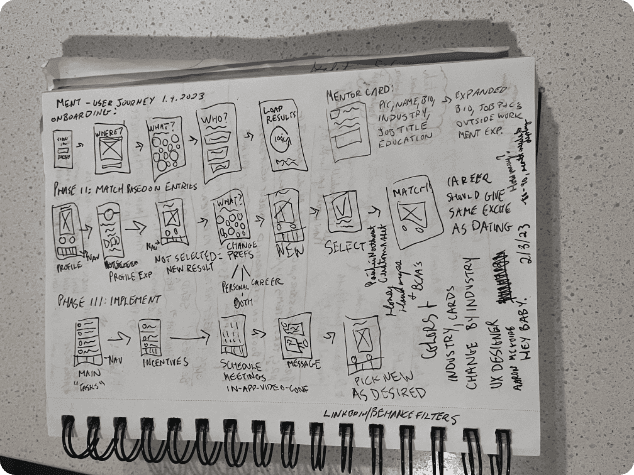
Digital Wireframes
After iterating through wireframe designs on paper, I shifted to Figma to begin creating digital wireframes. I wanted to ensure that end users could always find another mentor when they weren’t satisfied by their current one. End users also have the option to schedule meetings to strengthen connections.
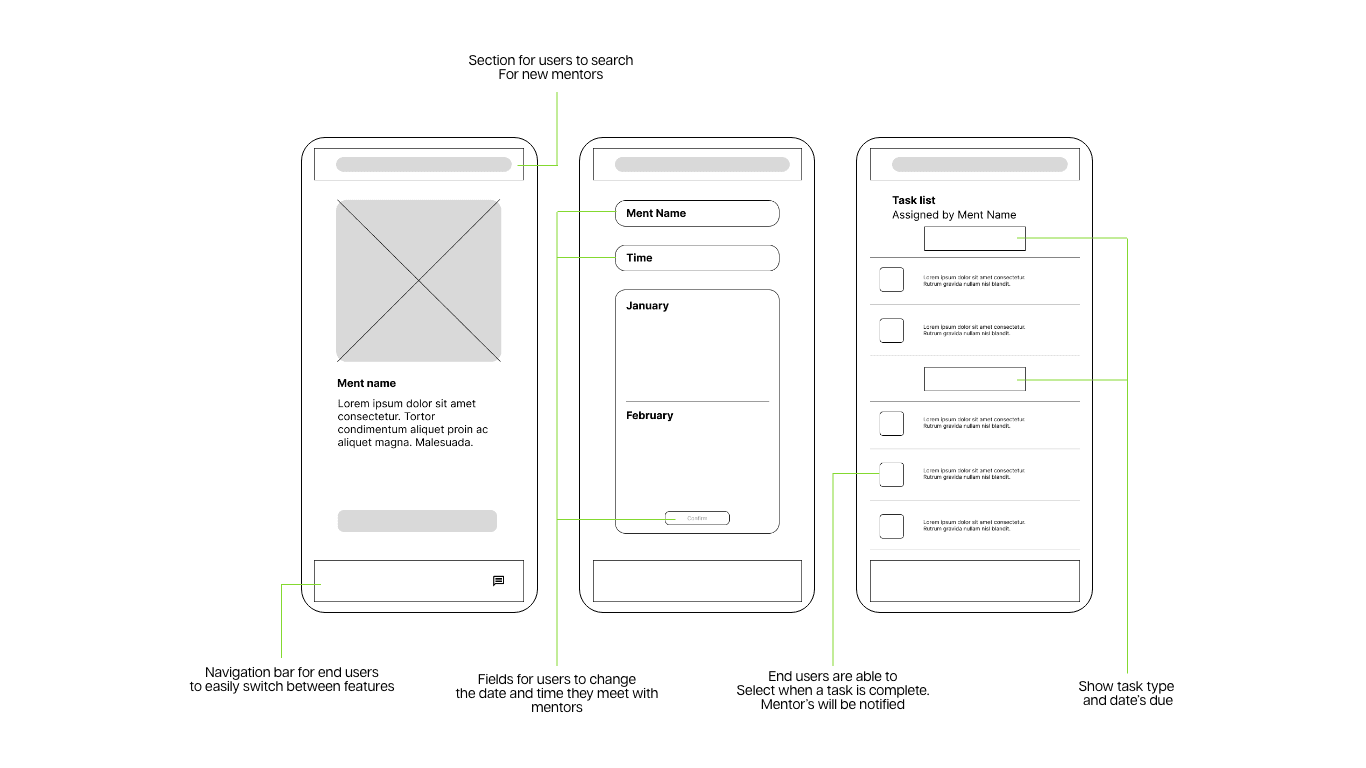
Lo-Fi Prototype
At this point digital wireframes were finalized and from there I began to develop a Lo-Fi Prototype in Figma.
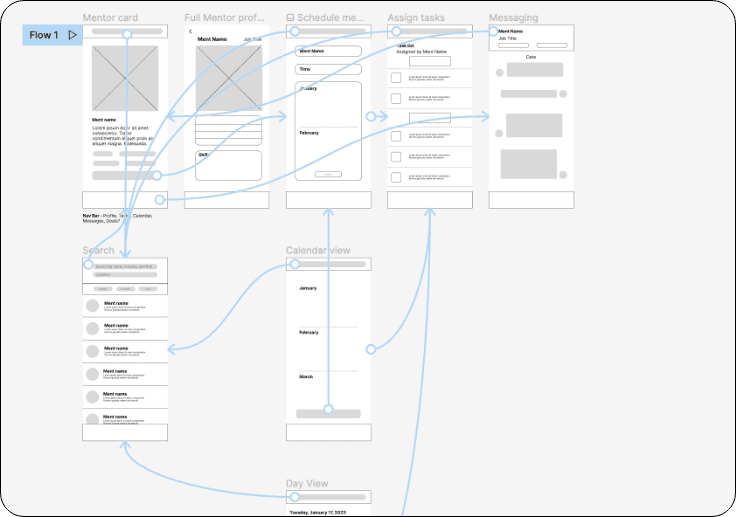
Here is an overview of that prototype: Ment - Lofi
Usability Study
After the Lo-Fi Design phase I conducted an unmoderated usability study.
My goal for the research was to see how quickly users were able to connect with a mentor that matches their goals. I analyzed their struggles and any suggestions they had.
Research Methodology
Study was held January 18-22, 2023
5 participants will match with a mentor, set up a meeting and send them any necessary messages.
Time spent: 30-45 minutes, not including questionnaire at the end.
Participants
This study is intended for recent graduates and students approaching undergraduate graduation. A mixed gendered group of 5 individuals, ages 19-23 will be tested.
This test is intended for first time college students. One student will be need color assistive technology
Affinity Map
Based upon the usability study and participant feedback, this affinity map was created.
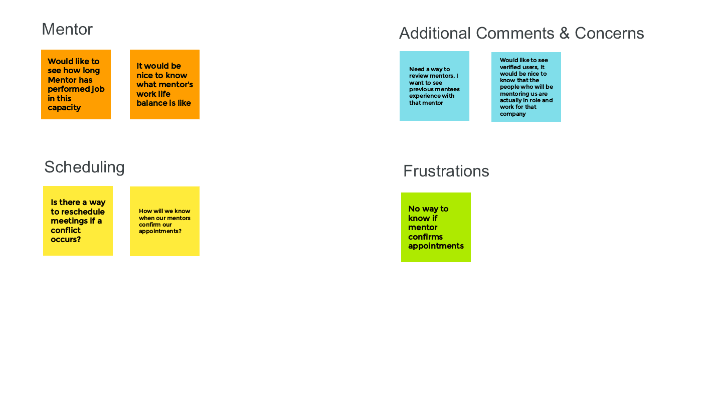
Insights
After the usability study was complete, insights were gathered and designs were iterated upon based on those insights.
Based on the theme that: Users would like to know how long a mentor has been in a role, an insight is: Job security is important to our end users.
Based on the theme that: Users would like to know what a mentor’s work life balance is like, an insight is: Having a good work life balance is important to our end users.
Based on the theme that: Users want to be able to reschedule appointments, an insight is: End users value communicating with their mentors.
Based on the theme that: Users want to know when mentors confirm their appointments, an insight is: Our end users value their mentors and their own time.
Based on the theme that: Users want to know if a mentor is verified, an insight is: Our end users value making meaningful connections.
Mockups
After iterating through wireframe designs on paper, I shifted to Figma to begin creating digital wireframes.
I wanted to ensure that end users could always find another mentor when they weren’t satisfied by their current one.
End users also have the option to schedule meetings to strengthen connections.
Onboarding
These screens are a mockup of the mobile onboarding process in both light and dark modes.
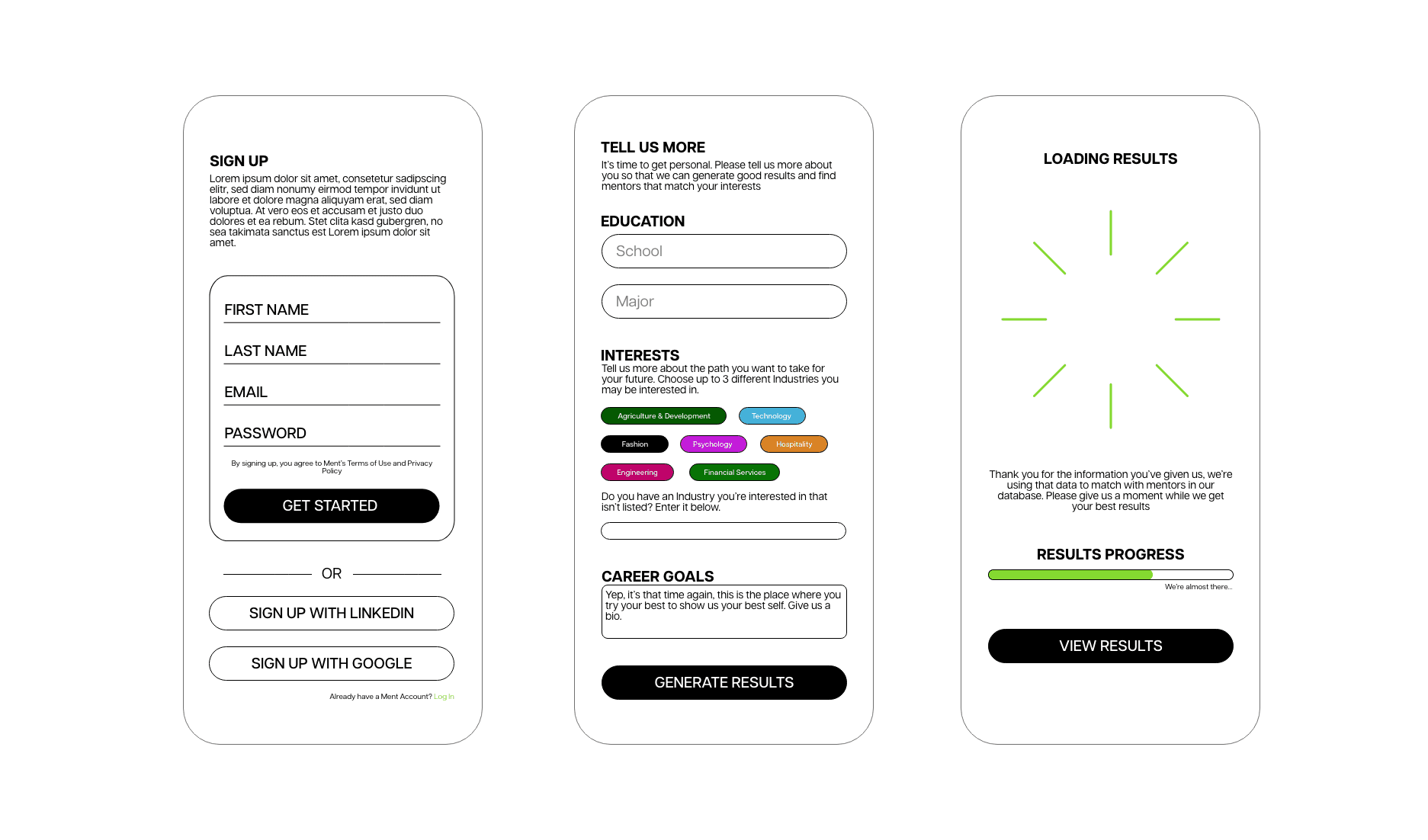
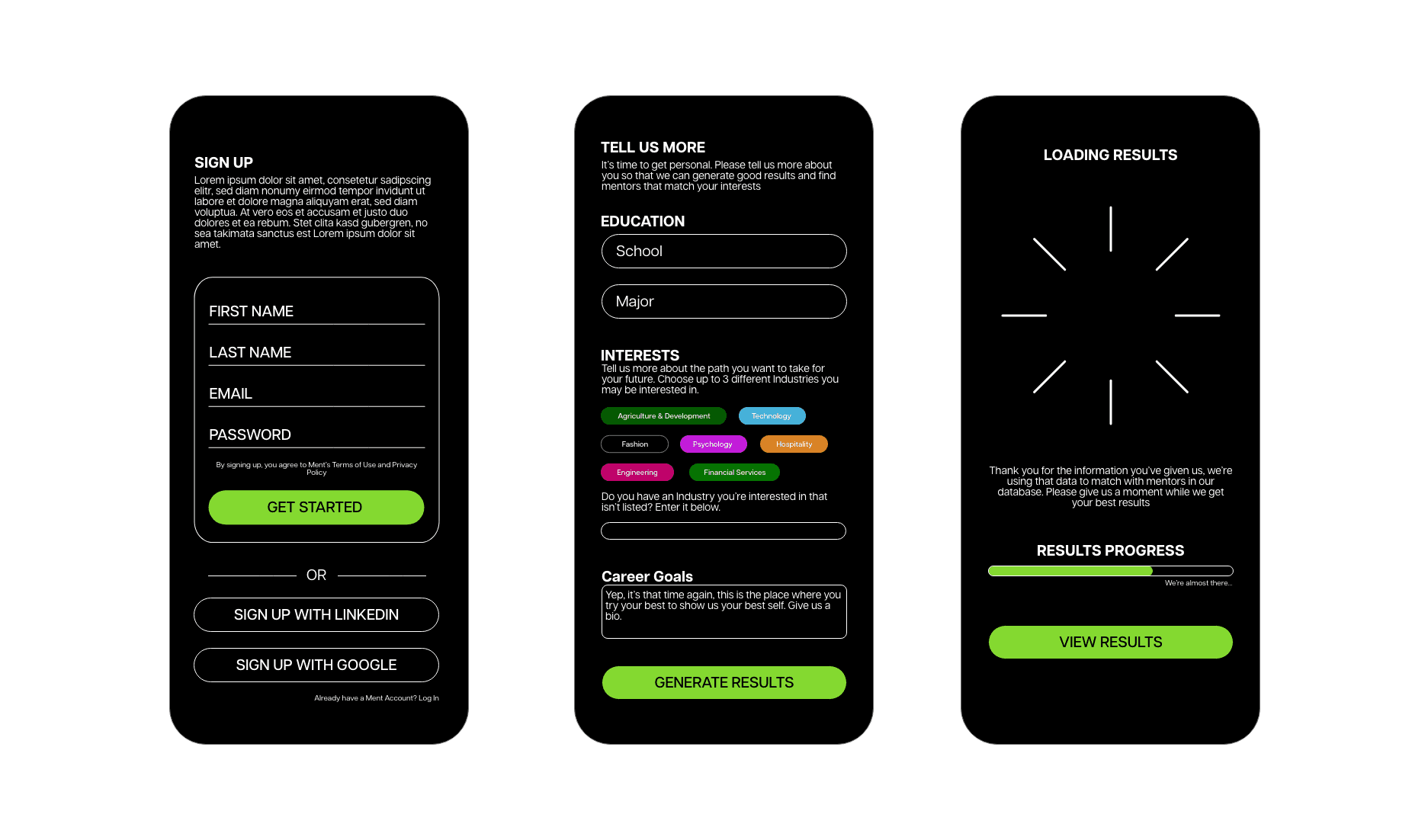
Mentor Cards
These screens are a mockup of what users will see when choosing a mentor.
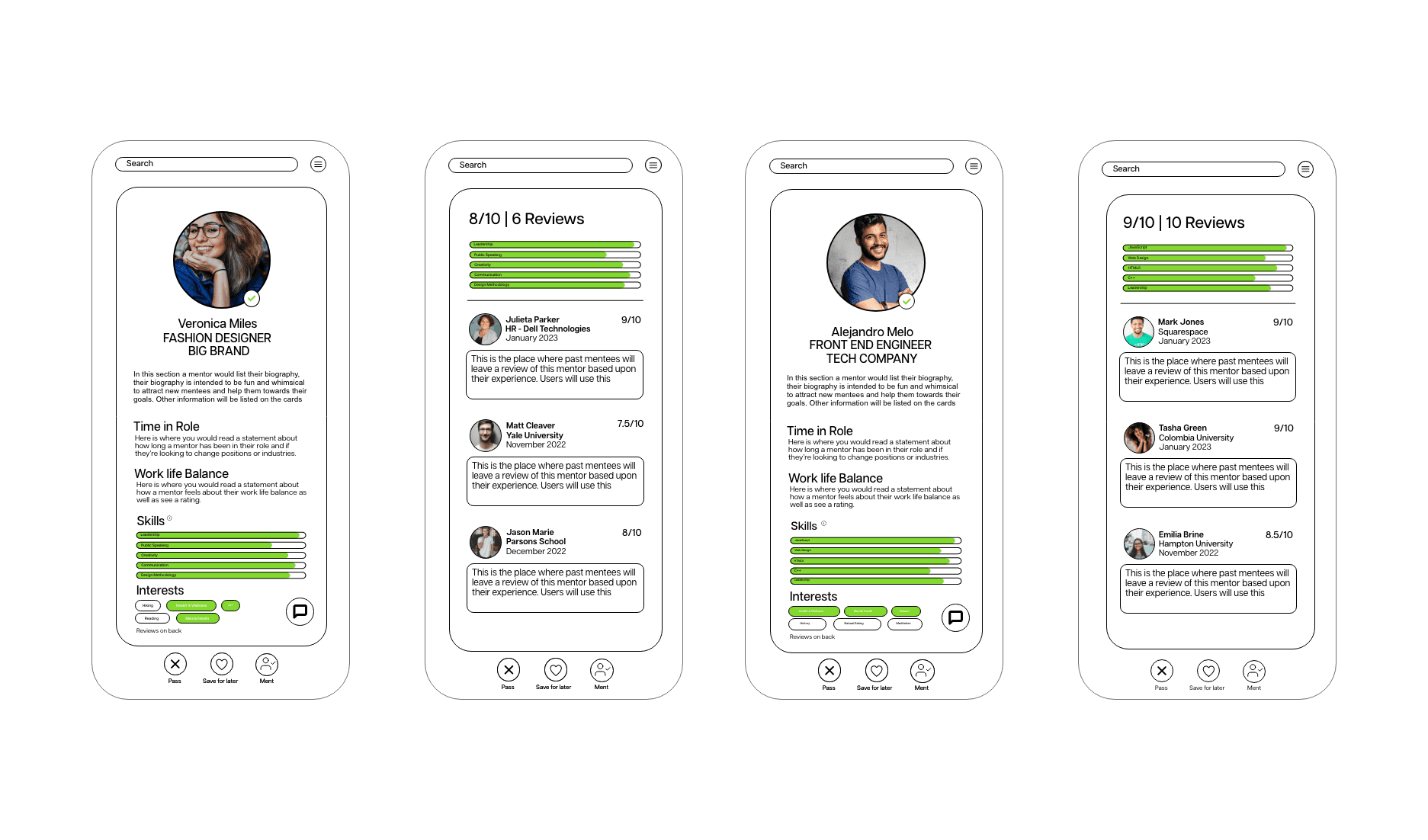
Interactions
These screens show the saved mentor profiles a user can choose from, what a user sees when a mentor is chosen and then the messaging interface.
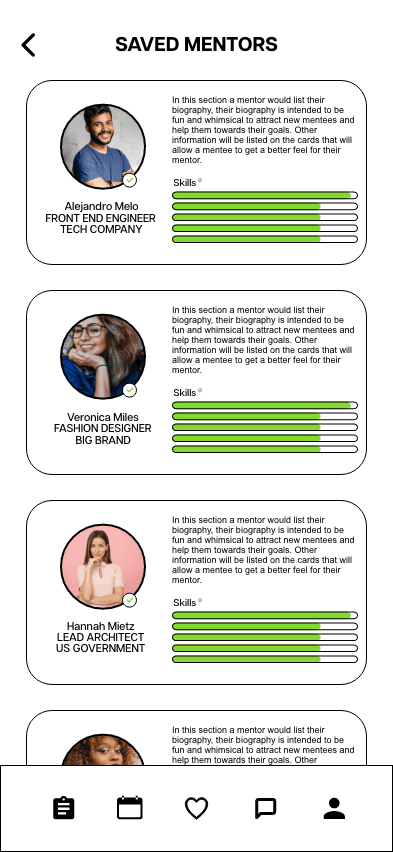
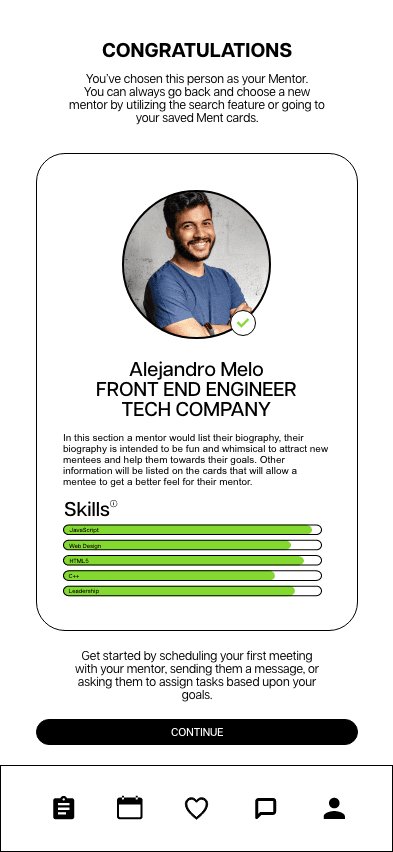
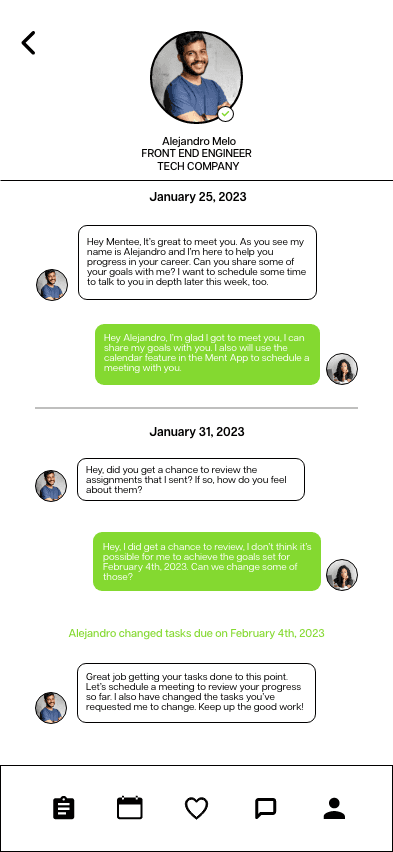
Calendar
After a mentor is chosen, here is what scheduling an appointment will look like.
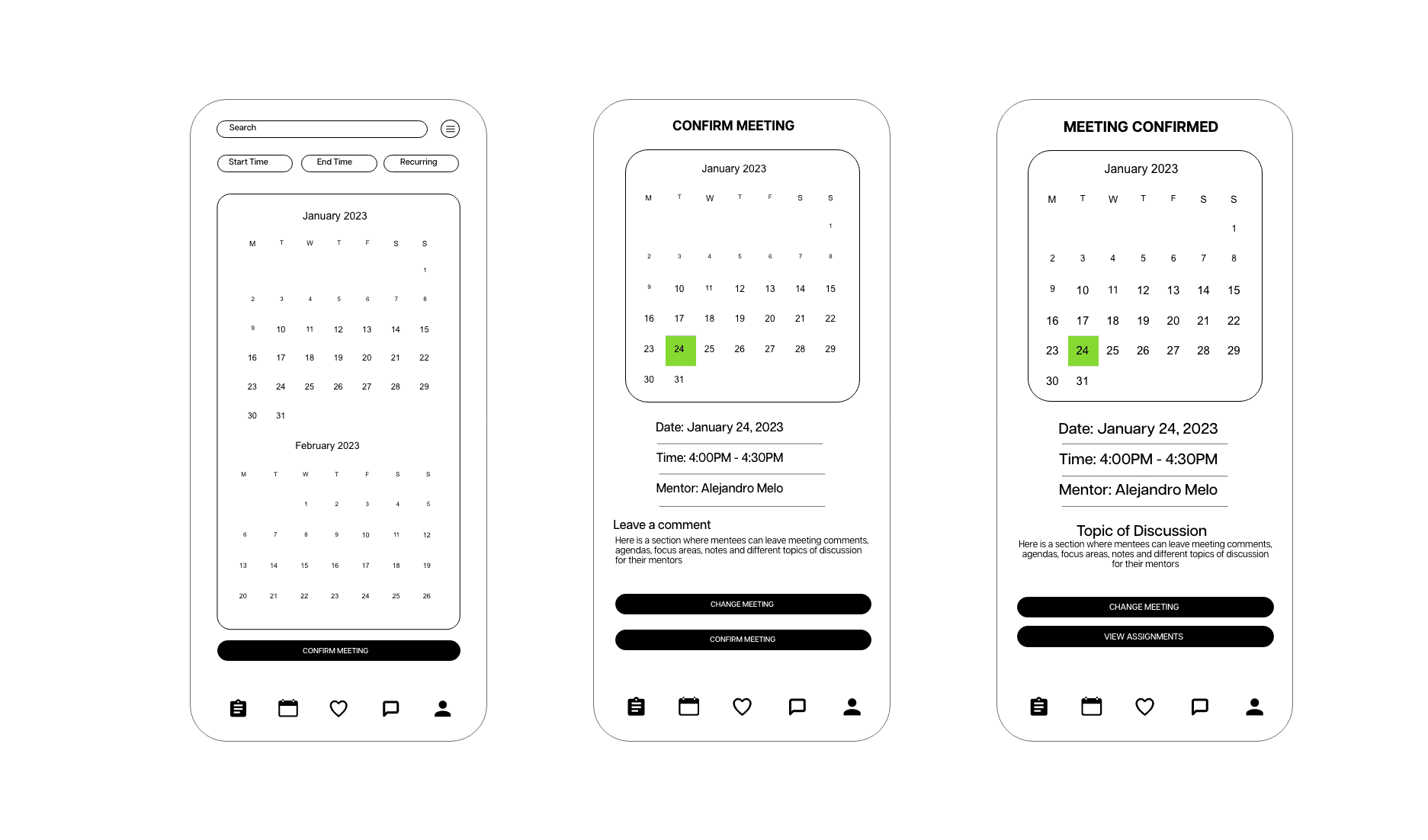
Assignments
This screen represents what users will see after they and their mentor have devised next steps.
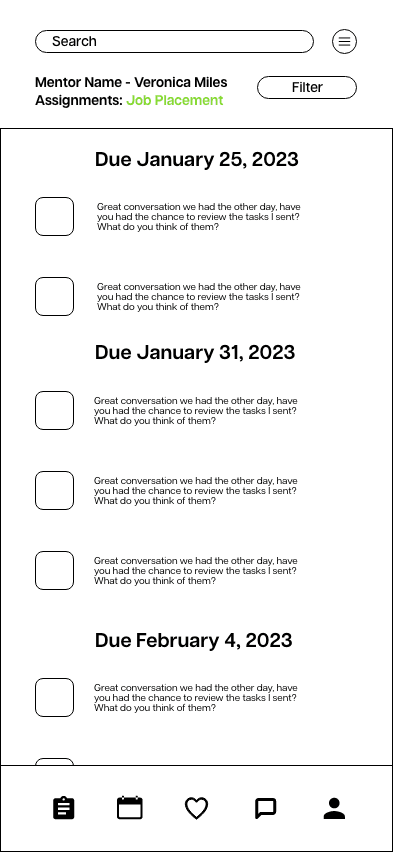
Key Takeaways
This case study highlighted and proved the positive impact of having a mentor during the collegiate and/or post-graduate career. Students who had a mentor felt more confident about their career decisions, suggesting that mentorship can play a crucial role in shaping one's career trajectory.
While this case study does not present a definitive answer to what makes one successful after college, it does shed light on some influential factors. Along with mentorship, other elements such as personal determination, networking, and adaptability play significant roles in post-graduate success and an app such as Ment helps a student maintain all of these factors for success.
Overall, this case study reveals that there is no one-size-fits-all formula for success after college. Each individual's journey is unique, and factors affecting success may vary significantly from one person to another. However, having tools such as an application modeled like Ment can aid in networking and post-graduate satisfaction.
